- Home
- Brian Garfield
Marshal Jeremy Six #4 the Proud Riders Page 3
Marshal Jeremy Six #4 the Proud Riders Read online
Page 3
Six reached the office door in two strides and pulled it open. “Ease your fist.”
It was his deputy, Dominguez. Dominguez was as big as a house. Two of him would have made a crowd. He said, “Trouble.” He had a matter-of-fact way of speaking the word.
“What kind?”
“John Paradise.”
Dominguez spoke the two words. They fell into the room and hung quivering in echoes. Six’s lips pinched together. Clarissa’s eyes widened a little; otherwise she did not stir. She was a slim woman with cool beauty and iron composure; if she was startled, or frightened, she did not show it.
Six said, “Where?”
“Drover’s Rest. He says he’s looking for Tracy Chavis.”
Six took in wind and let it out. Dominguez added, “He don’t seem to be in a bad mood or anything. He just sat down in the back of the place and started playing solitaire. Which is pretty tricky for him, since he’s only got one arm.”
“One arm?” Six said.
“Yeah. His right sleeve’s empty, pinned up.”
Six frowned. “You sure it’s John Paradise we’re talking about?”
Dominguez’ answer was soft and dry. “I ain’t about to make a mistake about that. I was in El Paso when he killed Ed White and Luke Sutro. I saw it happen. He had both arms then, but it’s the same man. Carries himself the same way, as if the whole world was a kingdom and he’d just been crowned.”
“And looking for Tracy Chavis,” Six said. “Did you talk to him?”
“No.”
“Tracy still out of town?”
“Still in the mountains, far as I know.”
Six muttered, “I don’t know. Maybe. The talk is, Paradise is retired.”
“I don’t generally believe everything I hear,” said Dominguez. “He’s got a gun on. Left side.”
Six said, “That doesn’t have to mean anything.”
Clarissa touched his sleeve. “Thousands of men have guns, Jeremy, but there’s only one John Paradise. Take care—please take care.”
Six covered her hand with his own. “Take it easy,” he told her. “I’ll just go up there and find out what he wants.”
She didn’t say anything more, but he saw the deep concern and fear in her eyes. He left her, going out front with Dominguez; he let the big deputy make a path through the crowd. When they reached the street and turned uptown, Six positioned himself on the deputy’s shoulder and fired questions at him. “You saw him fight in El Paso. Was he left-handed then?”
“Two guns. But he used the right one.”
“His right arm’s gone now?”
“That’s it.”
“Did you hear him say he was looking for Tracy?”
“Yeah.”
“How’d he sound?”
“Like he was asking for a sack of tobacco.”
“He didn’t make any threats?”
“Paradise ain’t the threatening kind,” said Dominguez. “They say he’s never raised his voice to a human being.”
“Just his gun,” Six replied drily. They turned the corner and tramped up-street toward the Drover’s Rest. He had never set eyes on John Paradise, but there wasn’t a soul in North America who hadn’t heard of the man. It was said that John Paradise had killed twenty-four men. It was said he had killed fifty-seven men. It was said .... There were dime novels and penny dreadfuls about him. Six had seen one of them. He remembered the title. Killer for Hire. His face was set and grim when he stepped into the Main Street and said to Dominguez, “All right, let’s have a look at him.”
Chapter Three
John Paradise was a compact, narrow man with Indian-black hair. His thin, almost fragile body was encased in a dark blue suit, the coat of which was cut away to allow his holstered gun to hang free. His arrogant high-bred face was elegant and arresting: the eyes, slitted behind high cheekbones and overhung by dark brows, were guarded and sardonic.
The empty right sleeve of his coat was pinned up neatly. With his left hand, Paradise slowly mixed a deck of cards.
There were four or five customers at the bar. Quite a few more had been in the place earlier, but Paradise had scared them out. Not by saying anything to them, nor by doing anything. It was merely his presence that drove them away. At first they came to look at him, to give him covert scrutiny out of the corners of their eyes when they thought he wasn’t watching them. But pretty soon the novelty wore off and they began to get scared. They hate me, John Paradise thought, for showing them that they can be afraid so easily.
It was an old and familiar occurrence; if it bothered him anymore, he was defended well enough to be able to ignore its effects.
The few men who remained in the place were knotted in a little group close together at the front end of the bar, farthest from Paradise’s solitary table. Snatches of their talk reached his ears on stray currents of air:
“Got a hell of a nerve showing up in this town. The marshal’ll give him what-for, you can depend on that.”
“Didn’t somebody say he come lookin’ for Tracy Chavis? Well, I seen Chavis pull a gun, and I guess he can handle any second-rate one-armed killer, if it comes to that.”
“Listen, anybody seen Jeremy Six? I think one of us ought to get him.”
“ ... Chavis won’t be hard to find, I reckon, if this buzzard wants a fight. Like I said, I seen Chavis handle a gun, and ...”
Hal Craycroft said mildly, “You boys ought to ease off. Maybe he’s just minding his own business, hey?”
“He’s lookin’ for Chavis, Hal.”
“Does that have to mean what you think it means, Jimmy?”
John Paradise’s slitted glance shifted quickly to the front doors; someone was coming. Paradise’s supple-fingered left hand slipped off the edge of the table.
When the kid came into the Drover’s Rest, Paradise’s face settled stoically. He didn’t even know the kid’s name, but he knew well enough why the kid was here. It was all part of a game that had started long ago: a game that would never be played all the way to the finish.
The kid had followed him all the way from Leadville, that was obvious; and the kid could only have one reason for chasing after him that far.
John Paradise thought he had discouraged the last of them three months ago in Denver when the two towheaded cowboys had braced him on Larimer Street. Paradise’s left-handed gun had cut them both to pieces before either one of them had fired a shot. The Rocky Mountain News had headlined the story on its front page. The Denver Post had run a cartoon showing a man erasing the inscription on a tombstone (“John Paradise, 1853-1886”) while a ghostly one-armed figure loomed behind the tombstone brandishing an enormous six-gun.
It should have put them all on notice: it should have said to them all, Crawl back under your rocks, it’s not time yet.
But somehow, just the same, here was one of them, standing just inside the front door of the Drover’s Rest saloon. Paradise recognized the kid; the kid recognized Paradise; there wasn’t anything they had to say to each other.
Paradise knew better than to talk. You could tell by the insolent know-it-all look in the kid’s eyes that there wouldn’t be any point in trying to talk the kid out of it. The kid had it all figured out. He’d probably spent three hours every day for the last six months, practicing his draw. But the speed of his draw was no measure of a man: how did you explain that to kids like this one? You didn’t explain it. All you did was stay alive, as long as you could. By this time, it no longer mattered whether the kid had a name. It didn’t matter at all. From the kid’s face you could tell that he didn’t have anybody who’d come and cry over his grave. Nobody at all.
The kid didn’t say anything. He just braced his feet and went for his gun.
John Paradise fired through the toe of his holster, without drawing his gun. He fired under the table, without standing up. He fired deliberately, without undue haste. He fired accurately, without seeming to aim.
He killed the kid with two bullets before the kid
had drawn his gun. The two bullet-holes were close together in the kid’s chest, so close they could have been covered by a silver dollar. The kid fell down and lost the grip on his gun, and began to curl up like a strip of frying bacon in a sizzling-hot pan.
The two shots made a terrible racket that echoed around the big room. Black powdersmoke rolled out from under Paradise’s table.
The smoke was still curling when Jeremy Six wheeled into the saloon, gun up. Six stood crouched inside the door, spraddle-legged above the kid’s body, and Dominguez loomed behind him, filling the doorway with his massive frame.
“Get up,” Six breathed. His gun lay steady on Paradise’s chest.
Paradise got up slowly, pushing his chair away with the backs of his knees. He wasn’t very tall; he was a slender little man who seemed ready to shatter in pieces at any moment.
Paradise said, “You’re Six,” as if that was all the identification the marshal needed.
“Your gun on the table,” Six said, “and step away from it.”
“I guess not,” said Paradise in a quiet voice.
Six said, “I don’t want to use this.”
“Then don’t.”
“I’ll kill you where you stand if I have to. I don’t fool around with your kind.”
“My kind,” Paradise murmured. The expression in his eyes might have been regretful. His shoulders stirred. “All right. One marshal more or less isn’t worth it, I guess.”
With great care, he lifted his gun between thumb and forefinger, placed it on the table, and walked back to the wall. He tipped his shoulder against the wall and hooked his hand in the armhole of his vest.
Six knelt by the dead kid. The big deputy crossed the room to the card table and picked up Paradise’s gun. Six reached across the body for the kid’s gun, put it under his nose, then opened the loading-gate and spun the cylinder to examine the revolver’s chambers.
He got to his feet and glanced at the little knot of men at the bar. Craycroft was swallowing in spasms and the others watched in various stages of numb disbelief. Six said, “Anybody know his name?”
There was no reply. Six looked down. “We can’t leave him here. A couple of you lug him down to the undertaker’s.” Two men came forward, picked up the kid and carried the body outside.
Dominguez had his six-gun out, tilted toward Paradise. Six came over, bouncing the kid’s six-gun in his fist. He said in a dead flat voice, “The barrel’s cold, Paradise. This gun hasn’t been fired.”
Paradise poked his jaw toward Craycroft and the other men at the bar. “Ask them what happened.”
“I’m asking you.”
“The kid drew his gun on me. He wasn’t fast enough.” There was no pleasure in Paradise’s voice; there was little regret in it, either. He seemed beyond regretting. He said in a soft way, “I didn’t know his name. He’s been following me for months.”
“Why?”
“Why do you think?”
“I’m asking you,” Six said again.
Paradise said amiably, “Marshal, you’ve got a nose as long as a starboarder’s arm.”
Six showed his displeasure. “Paradise, I’ve got no liking at all for you. I’ve seen too many men like you. You carry trouble with you like a contagious disease. But right now your best chance to avoid trouble stands in your answers to my questions. There’ll be a coroner’s inquest into that boy’s death. It will be up to the coroner’s jury to decide whether it was murder, manslaughter, or self-defense.”
“Sure,” Paradise said. “I understand.” He smiled vaguely. “You ought to learn to relax, Marshal.”
“I wish,” Six said gravely, “I had it in my power to close you down for good, Paradise.”
“The only time a marshal ever tried to close me down,” Paradise answered, “I closed him down. Don’t waste too much time entertaining that notion.” His voice gritted with sudden sarcasm. “You’d turn out to be the noblest suicide in the history of this town, I’m sure.”
It made Six grin slightly. “I wouldn’t count on that. Come on.”
“Where to?”
“Jail.”
“What about bail?”
“The coroner can set bail in the morning.”
“What’s it likely to amount to?” Paradise asked.
“Maybe two hundred dollars,” Six judged.
“That’ll just about strap me.” Paradise shrugged, picked up his hat, and went out of the saloon ahead of Six.
Paradise paid his bail—Six watched him count out the money, ten double-eagle gold pieces. It left Paradise with one five-dollar half-eagle in his pocket.
Paradise said. “How far can I go without jumping bail?”
Six said, “Technically you’re free to go anywhere in Arizona as long as you appear for the coroner’s inquest end of next week. But I’d suggest you stay in town and keep out of trouble. Out of sight, if you can. Otherwise I won’t be responsible for your safety.”
“I’ll be responsible for my own safety. Just give me back my gun.”
“Not while you’re on bail,” Six said. “Strap on a gun and you revoke your bail.”
“What the hell?” Paradise swiveled his eyes to the coroner.
The coroner nodded. “That’s the law.”
Paradise walked out of the courthouse, looking more angry than afraid. When Six came outside, Paradise said, “Tell me where I can find Tracy Chavis.”
“What do you want him for?”
Paradise said, “Your nose hasn’t shortened any, has it?”
“Tracy’s a friend of mine.”
“And you don’t want to see him get killed by the likes of me. I see.” Paradise stood on the sidewalk and threw his head back to look at Six: Six was a full head taller than the slender gunfighter, and Paradise had to look up at a sharp angle to meet Six’s eyes. There was a grave sober quality in Paradise’s glance. He said, “For whatever it’s worth, Marshal, I mean Tracy no harm. He and I were friends once. I heard he was in this part of the country and thought I’d pay my respects.”
Six considered it. Paradise’s claim did fit with what Six knew of Tracy Chavis’ past. There had been a time when Chavis had ridden the Circuit along with many another celebrated gambler-gunman of the bonanza boom towns.
Six said, “Tracy’s a settled man, Paradise. Married, raising a family. I don’t think he needs any memories stirred up.”
“Not by me, anyway, eh? Well, that’s all right. I’ll find him on my own hook.”
The one-armed gunfighter was about to turn away when Jeremy Six said, “I’d just as soon you didn’t pester half the town trying to locate Tracy Chavis. I’ll tell you where his place is. If you’re really a friend of his, maybe you can get him to hide you out until the inquest.”
“Fair enough, Marshal. I’m not particularly anxious to find any more trouble in this town.”
“You won’t have to find it,” Six murmured. “It’ll find you.” He lifted his arm toward the head of the street. “You ride north along the coach road eight miles until you come to a fork under the Mogul Rim ...”
Chapter Four
Paradise halted his horse and looked down into the little valley. Enclosed by timbered hills, the meadow ran down across a four-mile stretch as far as the high cliff of the Mogul and the peaks of the Yellows beyond. It was a pretty little place, the valley; there was no way to tell how much of the adjoining land also belonged to the ranch. A few spots on the flanks of the hills were grazing cattle, but there didn’t seem to be many of them. Roughly in the center of the meadow, shaded by planted cottonwoods and sycamores, sat the headquarters: two long single-story adobe buildings and a number of smaller outbuildings and corrals. All of them were sun-bleached, but the place seemed in excellent repair. It showed the touch of a loving hand. Everything was trim, neat, freshly painted.
But, along with that, everything was strangely quiet, as if the place had just been deserted within the past day or two. No smoke lifted from any chimney. No cattle grazed the va
lley floor; he could count the grazing cattle on the hills with the fingers of his two hands. No riders appeared anywhere in sight. No horses stirred in the corrals. It was like a ghost ranch.
Paradise’s horse was a small pinto, spry and limber. Unlike most horsemen, Paradise rode with his reins knotted together. The purpose was practical: having only one hand, he had to be able to drop the reins on occasion (to light a cigarette, lift a canteen, open a gate, tug his hat down, or draw his gun) and if the reins had not been tied together, they would have fallen to the ground. This way, they simply fell loose across the horse’s withers, there to be picked up again whenever the master was ready.
The pinto was trained to keep moving by knee-guidance, with or without the use of reins. It had taken a little while to teach the horse what it had to know, but for John Paradise the weeks of horse-training had been worthwhile. The horse’s intelligence and sound training served in part to make up for the rider’s lack of an arm.
Building a cigarette one-handed, Paradise now rode down into the valley, reins loose across the horn. He passed the ranch gate with the Chainlink brand burned dark into the wood; he turned the pinto up the trail with a nudge of the knee and rode into the yard.
The atmosphere of abandonment puzzled him. He tipped his black hat back on his head. Facing the house, he let his halloo sing out.
For a while he thought nobody was going to answer. He backed the pinto toward the barn and peered into the place. It was with a measure of relief that he saw three or four horses penned in stalls. At least, then, the place couldn’t have been entirely deserted.
A woman’s slim figure appeared on the porch of the adobe ranch house. One arm lifted to shade her eyes, she came forward to the edge of the porch, peering out at Paradise.
“Yes?”
He gigged the pinto over toward her, reining in at the porch. He kept his expression assiduously guarded: he gave away nothing of his feelings, while he watched recognition change her face.

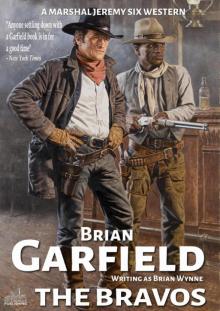 Marshal Jeremy Six #3
Marshal Jeremy Six #3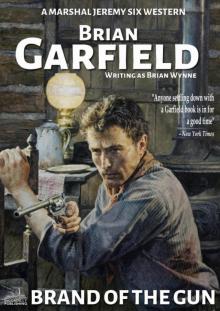 Marshal Jeremy Six #6
Marshal Jeremy Six #6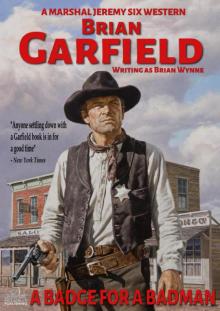 Marshal Jeremy Six #5
Marshal Jeremy Six #5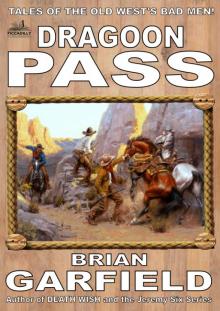 The Outlaws 2
The Outlaws 2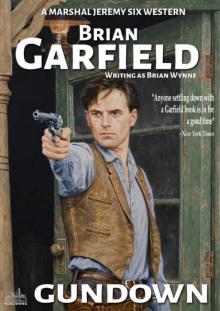 Marshal Jeremy Six #7
Marshal Jeremy Six #7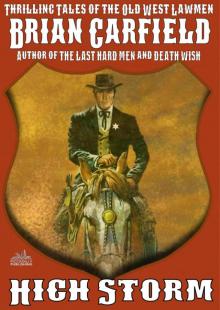 The Lawbringers 4
The Lawbringers 4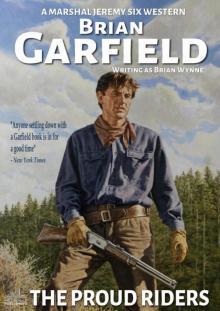 Marshal Jeremy Six #4 the Proud Riders
Marshal Jeremy Six #4 the Proud Riders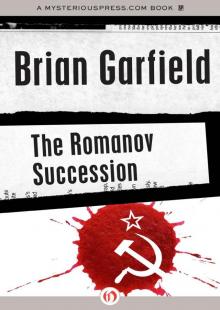 The Romanov succession
The Romanov succession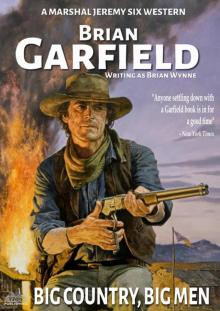 Marshal Jeremy Six #8
Marshal Jeremy Six #8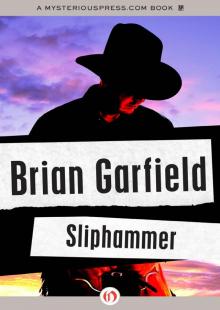 Sliphammer
Sliphammer Line of Succession
Line of Succession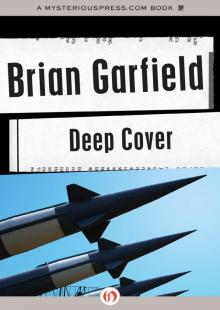 Deep Cover
Deep Cover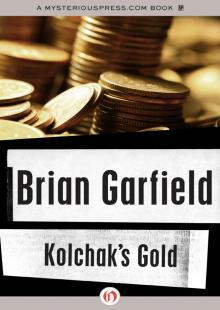 Kolchak's Gold
Kolchak's Gold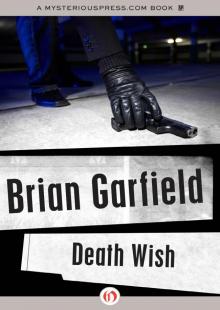 Death Wish
Death Wish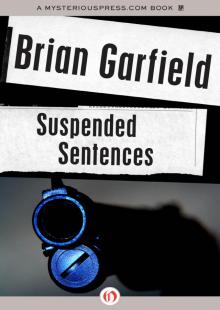 Suspended Sentences
Suspended Sentences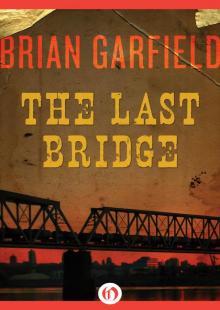 The Last Bridge
The Last Bridge Relentless
Relentless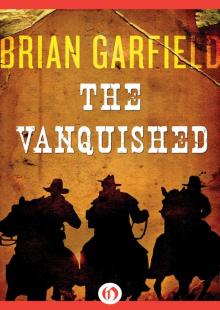 The Vanquished
The Vanquished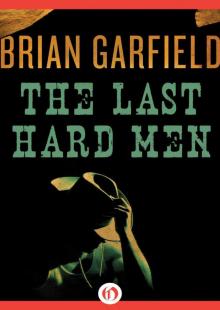 The Last Hard Men
The Last Hard Men Hit and The Marksman
Hit and The Marksman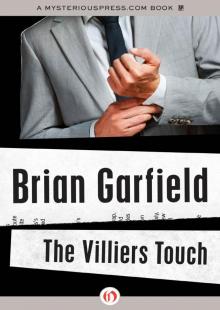 Villiers Touch
Villiers Touch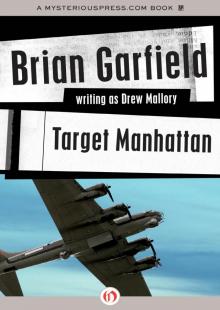 Target Manhattan
Target Manhattan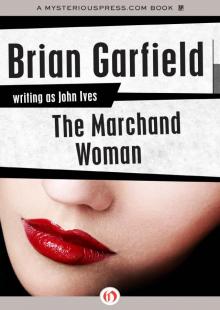 Marchand Woman
Marchand Woman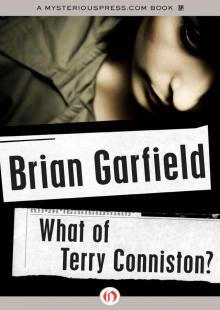 What of Terry Conniston?
What of Terry Conniston?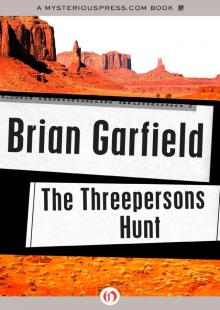 Threepersons Hunt
Threepersons Hunt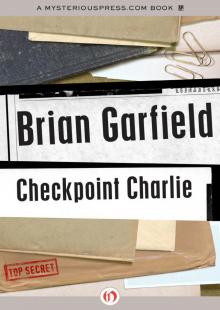 Checkpoint Charlie
Checkpoint Charlie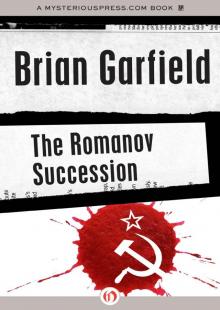 Romanov Succession
Romanov Succession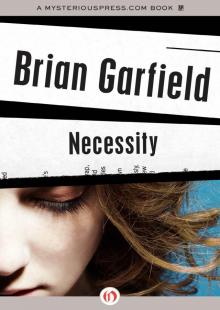 Necessity
Necessity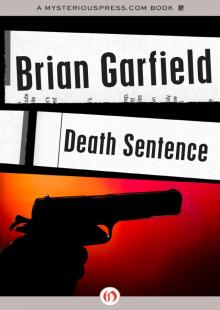 Death Sentence
Death Sentence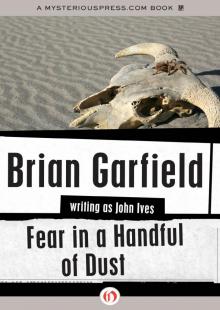 Fear in a Handful of Dust
Fear in a Handful of Dust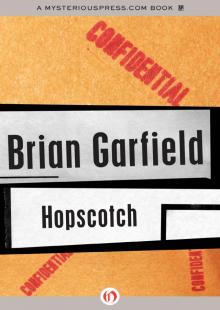 Hopscotch
Hopscotch